 By Jeff Alexander, Valspar Corporation
By Jeff Alexander, Valspar Corporation
Countless hours go into the drafting, design and construction of a building. Projects can last a few months or tens of years, but when the final pieces fall into place, a brand new building is left standing and it’s one of the proudest accomplishments an individual or company can achieve. Unfortunately, this achievement can be significantly marred by a simple act of vandalism: graffiti. With one spray of paint, stroke of a Sharpie, or swipe of shoe polish, the exterior surface of the newfound source of pride can instead turn into one of embarrassment.
In the United States, graffiti-based vandalism has grown drastically over the last several years, costing building owners across the country an estimated $12 billion in annual cleanup. Because of this, many U.S cities are passing strict regulations on how quickly graffiti must be removed. Traditional methods of removal are compounding the problem, as they are both expensive and time-consuming, which causes unforeseen costs and reduced productivity for building owners.
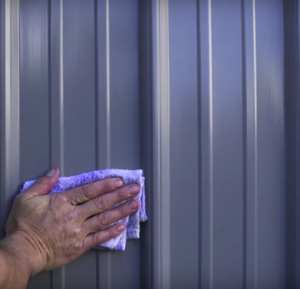 |
Learn how Valspar defeats graffiti by clicking here. | |
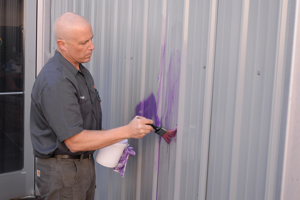 |
Innovative solutions help building owners quickly and effectively remove graffiti without damaging the underlying coating. | |
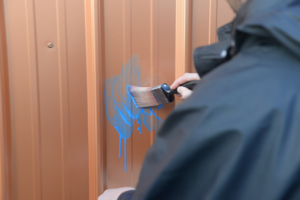 |
A simple brush-on, wipe-off application helps buildings maintain their original luster. | |
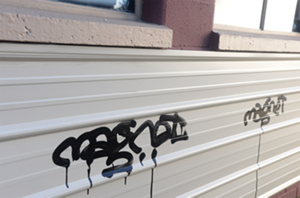 |
The best removal processes incorporate the use of water-soluble, biodegradable cleaning systems which are harsh on graffiti but preserve coatings. | |
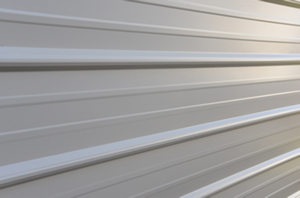 |
A few simple steps can help coated metal maintain its luster. | |
Luckily, recent innovations in coating technology are setting a precedent for the most effective treatment for addressing graffiti quickly and economically. Graffiti-resistant metal coatings paired with simple, environmentally friendly cleaning solutions are enabling small businesses and building owners to keep up with and even prevent the growing dilemma. Despite these advancements, not all products and processes are equal. Many coatings have been developed that claim graffiti or vandalism resistance, but the quality of these clear top coatings are not always consistent.
Sacrificial coatings form a transparent barrier on top of the surface they are shielding. However, because they are usually comprised of polymers, sacrificial coatings form a weak bond with the building surface, allowing them to wash away easily. As graffiti is removed by pressure washing the surface of the building, the top coating is removed, as well. This means the coating must then be reapplied after each wash, which can add up in both hard costs of the product and time spent redoing the work.
Semi-sacrificial coatings act as sealants to protect the pores of a coating or exterior surface. If the exterior is vandalized, the graffiti is removed using a combination of solvent and pressure washing. These coatings will last longer than sacrificial coatings, but will usually need to be reapplied every other time that graffiti is removed.
Permanent clear coatings provide a barrier that prevents markings from permanently sticking to an exterior surface. Made from expensive polyurethanes, nano-particles, fluorinated hydrocarbons, or siloxanes, these coatings can add more than 20 percent to the overall coating cost for a building. Plus, the solvents used to remove graffiti from permanent clear coatings can also cause damage to the building’s surface.
Permanent graffiti-resistant coatings offer a durable, long-term option, which when paired with a water-soluble, biodegradable cleaning system, can swiftly and safely eliminate graffiti without degrading the quality of the coating. This process offers a cost-efficient, environmentally friendly graffiti removal process that permits building owners to remove vandalism with a cleaning service rather than applying a new coat of paint to the exterior.
It’s also important to ensure that any coating your company uses is certified through the ASTM D6578/D6578M Standard, a testing process developed by the American Society for Testing and Materials International (ASTM). This standardized process evaluates anti-graffiti coatings to provide business owners the opportunity to compare claims made by different manufacturers and ensure the coating they select will provide graffiti-resistance on the building materials they have chosen for their new facility.
With a problem as rampant as graffiti, it is important for businesses to invest in a long-term solution that will save time and money. The combination of high-performance coatings and a tested and approved environmentally safe cleaning system can help businesses save substantial costs on repainting or replacing panels, offering the best solution to dealing with vandalism and graffiti.